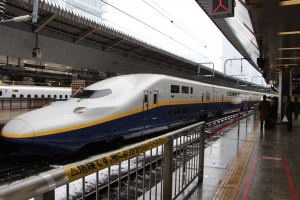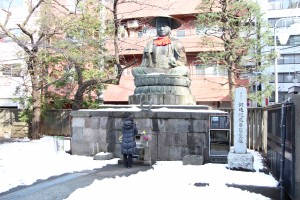1. Japanese People will go out of their way to help you.
On multiple occasions we had people stop and in broken English ask if they could help us. On our first full day, with major jet lag, we took a train to Osaka from Tokyo. We switched trains a few times and on our last train I left my camera bag under the seat. A woman ran to us with my camera bag. The train waits at the station briefly. At the expense of her almost missing her train, she brought me my bag. All she had to do was let the train depart and she would’ve had a new camera.
2. Trains in Japan are fast, punctual, everywhere, and fairly cheap.
When we plant a church we will have to consider how far a walk it is from a station. 1-5 min great! 5-10 min ok. 10+ not so much. We went 300 miles in 3 hours on a bullet train!
3. There were very few churches.
We travelled through a ton of Tokyo and other cities. We noticed no churches, other than those we planned on seeing.
4. Foreigners stand out big time.
We are loud, tall, and ignorant, at least in terms of their culture. When do we bow? How low do we bow? Is it ok to watch them bow and respond? Why are there shoes by the bathroom!? Adapting to culture is going to take practice and patience.
5. Everyone speaks English, right?
Nope. When we didn’t have Josh Stanford translating for us. We communicated in broken Japanese, hand signals, nods, and grunts. I’m sure many people looked and laughed! They responded the same way only in broken English. We came across very few people we could carry on in conversation. Learning Japanese is a must!
6. Getting in the wrong language school can really set you back.
We met a missionary that went to one language school for a while and then had to switch. Language school A covered book 1 in one year while language school B covered book 1 in the first semester (3 months)! Language school A cost $1500 USD a month while language school B cost $1500 USD for three months! A is 3x more expensive and 4x slower than B!!! We would have to go to A for 8 years before we got what B covered in 2 years! Talk about wasting time and money! Did this paragraph make you feel like you were back in Algebra class?
7. Idols are everywhere.
Have you ever noticed how common churches are in the South east? It seems like there is one on every street corner. That’s how idols and shrines seemed in Japan. We were on a random street in Tokyo, and there was a good size temple. I walked onto the grounds and in 15 minutes I watched about 12 people come in to worship and pray. They went to the idol, bowed, rung a bell, threw in some money and then prayed to a rock. A rock carved by human hands.
8. So Few (0.5%) know the truth about Christ.
They’ve heard His name in school. They learned he was a moral teacher or a god among their 8 million. Who needs another god, when you already have 8 million? They need GOD, not another god. Problem is, there are so few avenues for them to hear the Truth.
9. They are open to the Gospel
Gift giving (Omiyage) is a major part of Japanese Culture. This goes hand in hand with giving out tracts. To receive a tract (a gift) from someone on the street would be an inconvenience as they would feel obligated to give you something in return. However if they did something for you first (I.E. give directions, return a camera, or pick up a dropped glove), they would have no problem accepting a tract. We were able to give out many tracts as many people tried to help us! Also in Japan, it is not illegal to place tracts in their mail boxes. We were able to place hundreds of tracts into Japanese hands through their mailboxes! We also found that they were open to conversation about life, religion, and more importantly Christ! Now I’m not saying they accepted Christ on the spot, but what I am saying is that they were at least open to hearing the Gospel. The Bible says, “Faith cometh by hearing, and hearing by the Word of God.” If they will hear then…
10. It can be done in Japan!
Every missionary we met had success. People were getting saved and lives were being changed. Some ministries were small and some were large but they were all growing. People were hearing the Gospel. Churches have been started. Leaders have been trained. The Gospel is still the Power of God unto Salvation! As one missionary, who has been in Japan over 50 years, put it, “It can be done in Japan!”
Quick Summary:
- They are lost
- There is little Gospel witness
- They will listen
- It can be done!
The problem does not lie within the power of the gospel to save or with the Japanese to hear. The problem lies with the few laborers in Japan. “The Harvest truly is plenteous, but the Laborers are few.” Why don’t you pray about joining us?





